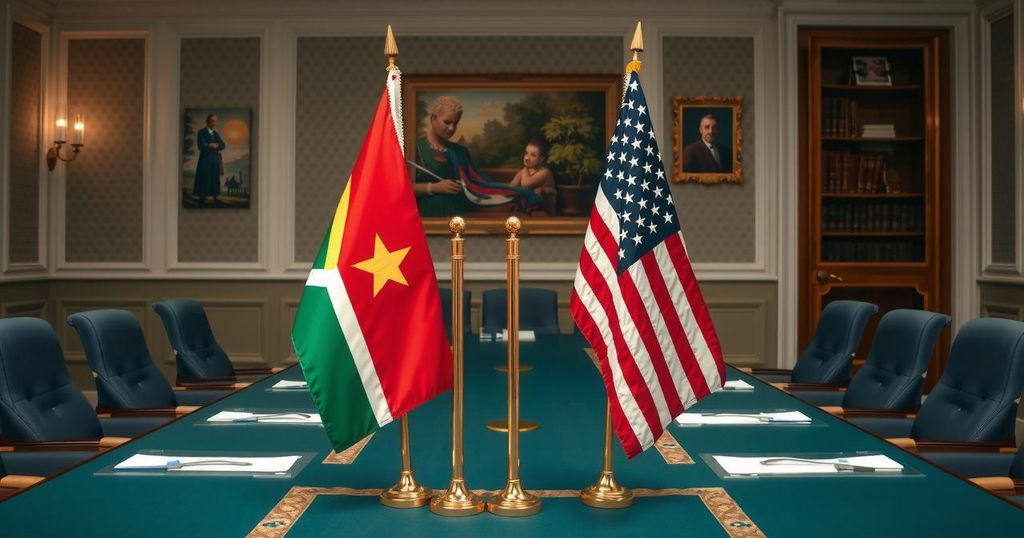Trump Challenges South Africa’s Ramaphosa on Land Seizures and Farm Violence

In a surprising exchange at the White House, Donald Trump challenged South African President Cyril Ramaphosa on claims of farm killings and land seizures. While Trump cited controversial media reports, Ramaphosa defended South Africa’s land reform process, focusing on legality and inclusiveness. Analysts believe this highly publicized moment could impact U.S.-South Africa diplomatic relations going forward.
In a surprising twist during a scheduled diplomatic meeting yesterday at the White House, former President Donald Trump challenged South African President Cyril Ramaphosa on serious allegations surrounding farm violence and land seizures in South Africa. What kicked off as a typical discussion centered on trade and security quickly shifted focus when Trump pressed Ramaphosa about claims of farmland confiscation by the South African government, and concerning reports of numerous white farmers being killed.
Witnesses report that the atmosphere turned tense almost immediately. “It felt more like a set-up than a summit,” noted one diplomat who preferred to remain unnamed. Trump pushed Ramaphosa to address land reform issues, citing information that has proliferated through conservative media outlets and online forums. He even referenced old video clips from 2018, alleging state-backed violence and property confiscation.
Trump was reportedly quite forceful, asking, “Isn’t it true your government is taking land without compensation?” He went so far as to produce printed screenshots from an American news site to support his claims. Ramaphosa, however, was prepared and responded with considerable poise. He emphasized that South Africa’s land reform strategy is both legal and aimed at rectifying historical injustices, not directed against any specific racial group.
According to Ramaphosa, “There is no state policy of confiscation. There is no campaign of killing. We are a constitutional democracy.” His firm stance appeared to communicate the complexity of the situation without escalating tensions further.
So, what’s the reality behind the allegations? It turns out, claims about the systematic confiscation of farms and the targeted killing of white farmers aren’t backed by compelling evidence. Sure, South Africa has been discussing potential constitutional amendments to allow land expropriation without compensation, but there haven’t been any sweeping confiscations to date. Essentially, these land reforms are about redistributing property that was, historically speaking, overwhelmingly in the hands of white South Africans due to apartheid policies.
Now about those farm murders—it’s true that farmers, regardless of race, have been victims of violence, and the murder rate for them is indeed higher than that of the general population. Yet, there is no substantial evidence to support the idea that these killings are racially or politically motivated. Back in 2018, the U.S. Embassy in South Africa stated that it had “no reason to believe that there is a deliberate campaign” against white farmers, and claims asserting that these occurrences amount to genocide have been thoroughly debunked by credible organizations like Africa Check, BBC Reality Check, and Human Rights Watch.
After the meeting concluded, President Ramaphosa’s office issued a measured statement highlighting that both leaders had a “frank exchange of views” and emphasized their commitment to ongoing dialogue. Trump took to social media to declare that he had “confronted the South African president with the truth the fake media won’t report.”
The aftermath of this meeting poses significant implications. Analysts suggest that while this moment might resonate positively with Trump’s supporters, it could potentially cause strain in U.S.-South Africa relations if not navigated carefully. In a subsequent media briefing, Ramaphosa reaffirmed his dedication to constitutional democracy, insisting, “We remain committed to addressing our country’s challenges through democratic means and dialogue, ensuring that all South Africans, regardless of race, feel safe and valued.” In the end, as one observer succinctly put it, “It’s political theatre for Trump, but it puts Ramaphosa in a tight spot.”
This meeting, marked by intense exchanges and diplomatic tightrope walking, highlights the delicate balance in discussing sensitive issues that resonate deeply within both nations.
In summary, Donald Trump’s confrontation with Cyril Ramaphosa during their meeting highlighted deep-rooted tensions regarding land reform in South Africa. While Trump brought forth aggressive allegations of farm seizures and violence against white farmers, Ramaphosa rebutted these claims, emphasizing a lawful and equitable approach to land redistribution. The diplomatic consequences remain uncertain, as this encounter could serve both to galvanize Trump’s supporters and to complicate U.S.-South Africa relations. Amidst the controversy, Ramaphosa’s commitment to democracy and safety for all citizens shines through.
Original Source: www.thestkittsnevisobserver.com







